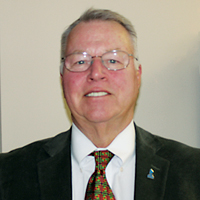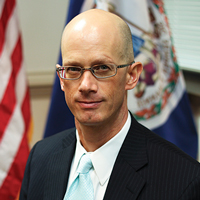The caller was frantic, the fear in his voice escalating with each word he spoke. He had been foolish, he knew, to drink and drive while visiting friends in New York City last spring. And now he was being arrested for the accident he had caused. Not wanting to tell his mother, he called the one person he knew he could trust unconditionally – his grandfather.
“Please don’t tell Mom – she’ll kill me!” the young man pleaded. “But can you send me some money to help me out of this mess?”
The grandfather, who lives in Chesterfield County, did as he was asked – wiring more than $50,000 to the “lawyer” involved in the case. It wasn’t until his grandson showed up at a family birthday party a few weeks later that he knew he had fallen victim to a scam.
“My father’s life savings are now gone,” said the victim’s daughter, who asked that the family not be identified. “My father is the smartest man I know – he studies quantum physics for fun – but this man will do anything for his family. He thought he was helping his grandson.”
Scams like this one are becoming all too common as social media allows criminals access to personal information about family members. In the Chesterfield case, for example, officials think the scammers studied the grandson’s Facebook page to uncover personal information about the grandfather, including his nickname.
“These people are very sophisticated and very successful, unfortunately,” said David Monticelli, a detective in the fraud unit with the Henrico County Police Division. “These crimes destroy their victims. They just devastate them.”
Because many seniors are too embarrassed to report the crime, it is impossible to know exactly how many fall victim to fraud. Monticelli estimates that his unit receives about five cases a month, with victims losing anywhere from a few hundred dollars to more than $50,000. Nationwide, the National Association of Area Agencies on Aging said financial exploitation of older Americans is increasing, a trend likely to grow as baby boomers age. Already, it costs senior citizens about $3 billion a year.
“The devastation that comes with senior fraud is an assault on dignity,” said Tom Gallagher, president of the Better Business Bureau of Central Virginia. “It’s horrible.”
The Better Business Bureau (BBB) established its Senior Fraud Program in 1998 to help seniors recognize and resist fraudulent offerings and possible scams. The program provides ongoing consumer and community awareness to prevent senior fraud, assists and advises senior citizens on business rights and practices, and works closely with the many different agencies, senior centers, and businesses that serve the senior population.
In 2014, the BBB made forty-one senior fraud group presentations to nearly two thousand consumers. That’s nearly double the number of presentations the BBB was called on to offer in the previous year.
“We are doing everything we can to help reduce the number of victims,” Gallagher said. “But I see it all the time – the crime just continues.”
The intricacies of each scam vary, but one of the most common is the IRS scam, where the perpetrator will call a senior and demand he or she pay back-taxes they do not owe. The caller promises to lower the amount owed if the senior pays immediately.
The Virginia Power scam is also popular. Here, the caller threatens to disconnect the homeowner’s electricity if the bill is not immediately paid. Other popular cons include home-repair scams, asking for donations to a non-existent nonprofit, and the sweepstakes scam, where callers inform victims they have won a cash prize, but first must pay the taxes on the winnings.
“It breaks your heart,” said Mike Huberman, deputy Commonwealth attorney for Henrico County. “You think about your own family. You think this could be you. It’s heartbreaking.”
In a recent scam in Henrico, Huberman said perpetrators posing as contractors singled out seniors by looking for handicapped license plates on cars in small neighborhoods. Their sales pitch aimed to gain trust by saying, “I just fixed your neighbor’s roof and noticed you had a few loose shingles. Would you like me to take a look?”

Localities have more luck prosecuting these local scams than the cons carried out by perpetrators calling from another country. These more sophisticated criminals rely on the Internet as the transmission medium for telephone calls (voice over Internet protocol), which is impossible to trace. They ask for payment using prepaid debit cards, which are impossible to trace, or insist the money be wired to a specific account overseas.
“It’s almost impossible to make an arrest because they are overseas,” Monticelli said. “Most are from Nigeria, the Ukraine, and the Bahamas. As soon as the money leaves the country, there’s a brick wall that goes up. It’s very frustrating.”
What’s even worse, Monticelli said, is that in some places like Nigeria, the art of scamming seems to be applauded.
“It’s actually a type of family business there,” he said. “It’s almost respectable. The banks over there don’t stop it because it’s bringing money to the local economy. There’s no incentive to stop it.”
And the perpetrators just keep getting better at what they do.
“They’ll watch the obituary pages in the newspaper and prey on the family,” Gallagher said. “It’s horrible. I believe in most cases, seniors have a nagging doubt. I think it’s a dynamic to loneliness.”
Why are seniors such popular targets? Oftentimes, perpetrators envision them as wealthy, living off a nice retirement. They also view them as easy marks because they are usually trusting of people, can suffer from dementia or memory loss, and often feel isolated. And since so many scams go unreported and are difficult to prosecute, they are considered a low-risk crime.
“These seniors have worked their whole lives to build a career and to raise families,” Monticelli said. “When they should be enjoying their retirement years, they instead become victims of a terrible crime. Senior fraud is a constant battle that we will continue to fight.”
Did you know?
U.S. Boomers reports that while senior citizens represent twelve percent of the U.S. population, they account for thirty-five percent of all fraud victims.
The National Adult Protective Services Association (NAPSA) says one in twenty older adults has experienced some form of perceived financial mistreatment.
NAPSA also reports that only one in forty-four cases of financial abuse is ever reported.
Staying Ahead of Scammers
The best offense is a solid defense when it comes to battling scammers.

“Don’t be afraid to talk to your family, a friend, or a neighbor if you suspect something is not right,” said David Monticelli, a detective with the fraud unit of the Henrico County Police Division. “Scams are like a virus. They are always changing just a little bit to throw us off.”
Criminals will always be out there, devising new schemes to con seniors out of their hard-earned retirement. That is one fact we can never change, Monticelli said. But we can be armed for battle.
“We need to catch it before it happens,” he said. “That means seniors should report any suspicious activity – even if they are embarrassed to share their story.”
Those who have become victims of a scam should spread the word through social media and word of mouth – anything to let others know the same thing could happen to them.
“Too often, cases don’t get reported because the victim is embarrassed or scared,” said Tom Gallagher, president of the Better Business Bureau of Central Virginia. “Scammers often warn them not to tell anyone.”
When scammers go door-to-door posing as contractors, for example, seniors can feel intimidated.
“Physically, they are frightened,” Gallagher said. “Then they feel ashamed.”
Banks too should be on the lookout for suspicious activity, calling account holders and their family if they suspect fraud. In the grandson scam that occurred last spring in Chesterfield County, that did not happen, the victim’s family said.
“Why the bank did not question it, I don’t know,” said the victim’s daughter.
Her father thought he was wiring money to his grandson in New York to help him out financially after a car accident. But the money instead went overseas while the grandson was safe and sound at home.
“My father was a customer of that bank for fifty years,” his daughter said. “The action he took was obviously odd behavior… he depleted his savings! Why no red flag was raised is beyond me.”
The family’s case is under investigation, but they know the likelihood of catching the culprits is slim.
“Very few get caught,” Gallagher said. “It’s so important to be proactive.”
Gallagher encourages seniors who are online to change their passwords often, be cautious about what they post on social media, and call the authorities if they suspect something is just not right.
“Seventy-five percent of the people I’ve shared our story with have said they’ve heard of something similar,” said the daughter of the Chesterfield County scam victim. “I tell everyone I know about it.”
After the incident, she established a code word with her family, so if anyone has doubts as to who is calling, they simply ask for that magic word or phrase.
“I never thought this would happen to our family,” she said. “But the truth is, the crooks and thieves are out there. They won’t disappear. The best thing we can all do is protect ourselves and each other by spreading the word. We are all in this together.”
 Don’t Become a Victim
Don’t Become a Victim
• Never send money or give out personal information such as credit card numbers, bank account numbers, dates of birth, or Social Security numbers to unfamiliar companies or unknown persons.
• If you have doubts about a tele-marketer’s legitimacy, be sure to ask for their company’s name and address, along with a phone number where the caller can be reached at a later time.
• For elderly widows, if a caller asks for the man of the house, don’t say there isn’t one and never indicate that you live alone. Same goes for widowers.
• Talk to family and friends or call your lawyer, accountant or banker and get their advice before you make any large purchase or investment over the phone with a stranger.
• Research unfamiliar companies with your local consumer protection agency, Better Business Bureau, the National Fraud Information Center, or other watchdog groups.
• Be sure to sign up for the Federal Trade Commission’s Do-Not-Call-Registry. Telemarketers who continue to call you after you have registered are subject to penalties. You can sign up at donotcall.gov or at (888) 382-1222.
• Don’t be afraid to simply hang up the phone when a stranger calls trying to sell you something you don’t want.
Tips provided by Caregive.com
If you suspect you’ve been the victim of a scam:
Don’t be worried or embarrassed to talk about it with someone you trust. You are not alone, and there are people who can help. Doing nothing could only make it worse.
• Contact your local police department
• Better Business Bureau of Central Virginia:
804-648-0016
bbb.org/richmond/
• Adult Protective Services:
1-888-832-3858
dss.virginia.gov/family/as/aps.cgi
Top Ten Scams
1. Sweepstakes and Lottery Scams
One of the oldest in the book, scammers inform their mark that they have won a lottery or sweepstakes of some kind and need to make some sort of payment to unlock the supposed prize or to pay the taxes up front.
2. The Grandparent Scam
The Grandparent Scam is so simple and so devious because it preys on what is often an older adult’s most reliable asset, his heart. The fake grandchild will usually ask for money to solve some unexpected financial problem, to be paid via Western Union or MoneyGram, which don’t always require identification to collect.
3. Health Care/Medicare/Insurance Fraud
Perpetrators pose as a Medicare representative to get older people to give them their personal information.
4. Counterfeit Prescription Drugs
Most commonly, counterfeit drug scams operate on the Internet, where seniors increasingly go to find better prices on specialized medications. But with this scam, they are buying something that will not help their medical condition. This scam is growing in popularity. Since 2000, the FDA has investigated an average of twenty such cases per year, up from five a year in the 1990s.
5. Funeral & Cemetery Scams
Claiming the deceased had an outstanding debt with them, scammers will try to extort money from relatives to settle the fake debts.
6. Fraudulent Anti-Aging Products
Whether it’s fake Botox like the one in Arizona that netted its distributors (who were convicted and jailed in 2006) $1.5 million in barely a year, or completely bogus homeopathic remedies that do absolutely nothing, there is money in the anti-aging business and scammers know it.
7. Telemarketing
Perhaps the most common scheme is when scammers use fake telemarketing calls to prey on older people, who as a group make twice as many purchases over the phone than the national average. With no face-to-face interaction, and no paper trail, these scams are incredibly hard to trace. These include charity scams, which are especially popular after a natural disaster.
8. Internet Fraud and Email Scams
Pop-up browser windows simulating virus-scanning software will fool victims into either downloading a fake anti-virus program (at a substantial cost) or an actual virus that will open up whatever information is on the user’s computer to scammers. With an email scam, a senior might receive email messages that appear to be from a legitimate company or institution, asking them to update or verify their personal information. A victim might also receive emails that appear to be from the IRS about a tax refund.
9. Investment Schemes
From pyramid schemes, to tales of a Nigerian prince looking for a partner to claim inheritance money, to complex financial products that many economists don’t even understand, investment schemes have long been a successful way to take advantage of older people.
10. Home Repair Gimmicks
People posing as contractors will tour neighborhoods, knocking on doors to tell homeowners they are in the area for just the day to trim trees, seal driveways, or repairs roofs. They offer a good deal if paid that day and often ask for money up front for supplies.




